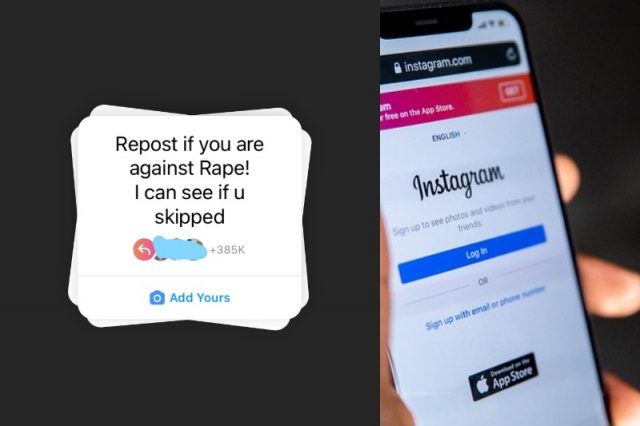
A new chain mail-like trend through Instagram Stories about advocating against rape was called out by some online users as “performative activism.”
The trend follows an Instagram Story with a text that seemed to prompt users to share or repost the story if they are against rape.
One text read: “Repost if you’re against rape, I can see if you skipped.”
Another variation read: “Share if you’re against rape and sexual abuse.”
It has a similar structure as chain emails or letters where people share or distribute one message with caveats should recipients choose to break the chain.
However, in this case, users are guilt-tripped into sharing the Story to avoid being put in a bad light.
The Stories also have no background image. They only showed the texts with the profile photos of users who have joined the trend.
It’s difficult to trace when and how the trend started. According to some social media users, they have been seeing more of these posts on Instagram this month.
Some social media users posted screenshots of this rising trend on Facebook and Twitter.
y’all have absolutely LOST your minds. pic.twitter.com/1OcNWqrt6M
— ryn (@RYNR0TICA) December 6, 2021
Some Twitter users perceived the movement to be merely “performative.” They particularly criticized the remark “I can see who skipped.”
“Don’t guilt trip us for not doing something. Just because one does not repost a story does not mean that one supports a heinous act,” wrote lawyer Gideon Peña.
“Tigil tigilan niyo nga tong performative activism sh*t na ‘to may kasunod pang I can see who skips amp go touch some grass!” another Twitter user added.
“Serious topics + forced reposts = performative activism,” an online user tweeted.
Some social media users also pointed out that such initiative neither helps the victims nor address the issue.
“Seeing IG stories containing ‘Repost if you’re against rape, I know if you skip’ is very unsettling. It misdirects the issue and demonizes non-sharers instead of addressing the crime. To mainstream anti-sexual harassment, consider instead: ‘Drop thing/s we shouldn’t do to others’,” sociology instructor Ash Presto said.
“Ano na naman ba ‘tong performative activism niyo sa IG. Not everyone is capable of talking about rape and it may cause trigger for some, tapos no trigger warning pa sa post itself. ‘di ko rin magets nakalagay pa ‘I can see who skipped!’ it doesn’t help, TBH,” another Twitter user wrote.
“Wala naman kayong natutulong sa biktima, nangtitrigger lang kayo lalo ng trauma,” a Twitter user said.
What is performance activism?
The term “performance activism” started to gain prominence during the height of the Black Lives Matter movement last year following the death of George Floyd.
In an article from Mashable, activist Melina Abdullah was quoted defining performance activism as “getting the so-called glory of activism without having to pay any price.”
An article from Illumination via Medium also described this movement as something done for attention purposes only.
“People who have demonstrated performative activism use it as a one-off action and on a one basis instance. Users of performative activism only act as “allies” when it is convenient for them and they use if for their own personal gain, in order to be viewed as an ‘ally’ by society, in an attempt to avoid backlash and criticism,” writer Petiri Ira said.









